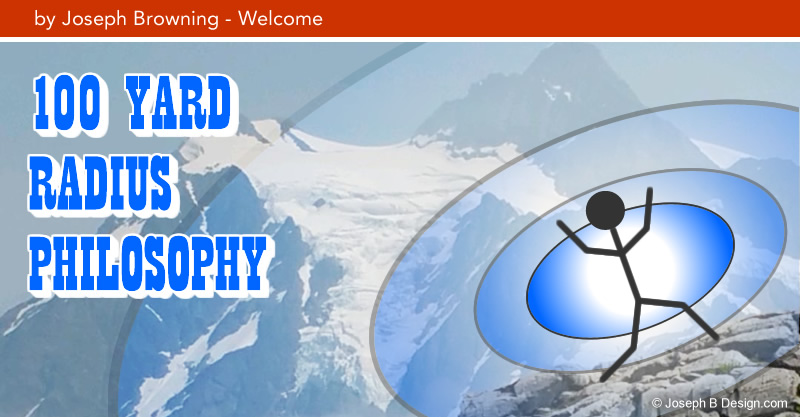
CHAPTER ONE – An American Viewpoint
"We know more and feel better about what our senses can truly determine, than we do about what they can't." This is the simple premise of the 100 Yard Radius Philosophy.
Each person on the planet, at any given time, has a radial sight range of about 100 yards, or 50 yards in all directions from where you stand. 100 yards is the length of a football field, so you can reference that to help you visualize what I'm saying. At times there may be obstacles blocking your sight range and limiting it to less than 100 yards, and other times there will be no obstacles, allowing you to see much farther than a 100 yard radius. For now, just imagine that you and everyone you see around you each have this general 100 yard visual range and are all affected by the things and events that fall into that range.
Now imagine that our 100 yard radiuses follow us around wherever we go. Sometimes multiple people and their respective radiuses will be interacting together, and so you can imagine these visual radiuses overlapping and intersecting one another. Sometimes when a group of people are watching a single event, like a football game, they all will see slightly different versions of the same event, because their visual radiuses are all being viewed from each person's unique perspective.
"We know more and feel better about what our senses can truly determine, than we do about what they can't." This is the simple premise of the 100 Yard Radius Philosophy.
Each person on the planet, at any given time, has a radial sight range of about 100 yards, or 50 yards in all directions from where you stand. 100 yards is the length of a football field, so you can reference that to help you visualize what I'm saying. At times there may be obstacles blocking your sight range and limiting it to less than 100 yards, and other times there will be no obstacles, allowing you to see much farther than a 100 yard radius. For now, just imagine that you and everyone you see around you each have this general 100 yard visual range and are all affected by the things and events that fall into that range.
Now imagine that our 100 yard radiuses follow us around wherever we go. Sometimes multiple people and their respective radiuses will be interacting together, and so you can imagine these visual radiuses overlapping and intersecting one another. Sometimes when a group of people are watching a single event, like a football game, they all will see slightly different versions of the same event, because their visual radiuses are all being viewed from each person's unique perspective.
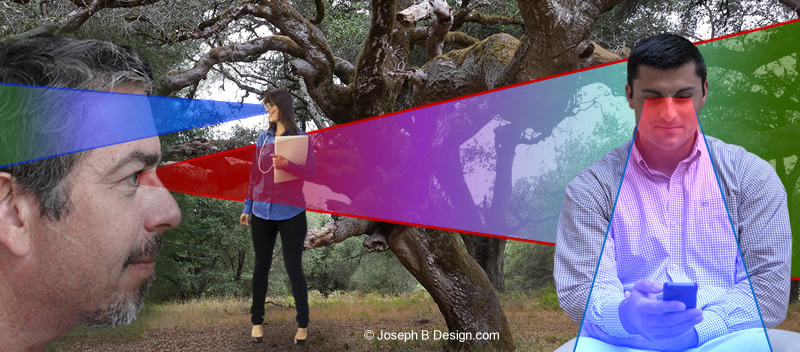
In addition to seeing what's in our radiuses, we experience our radiuses through our other senses: smelling, hearing, touching and tasting, as well as what we can intuitively and energetically pick up, and finally how we feel around all of it. All of these factors help to define both who we are and what we are witnessing around us in our 100 yard radius.
Each of us has different interpretations of what we experience within our own 100 yard radiuses, and we also have differing feelings around those interpretations. So while we are all simultaneously seeing the things and events happening within our own visual radiuses, we often see the same thing very differently. For every different person, there are different interpretations of the reality we share.
The 100 yard radius philosophy embraces the notions of "seeing is believing" and "you only know what your senses can determine." Simply stated, it is much easier to be convinced about the reality of things or events that you can personally witness within your 100 yard radius. When you can see it, smell it, taste it, hear it, touch it, or feel it, it is more likely that you'll have a sense of really knowing it and believing that it is real. However, if you are hearing a story about a thing or event, no matter how descriptive and well told the story is, your sense of really knowing the reality or truth of the story is considerably less.
People in America use the internet, cell phones, and television to access various kinds of stories, information, photos, moving pictures, advice, opinions and entertainment, otherwise known collectively as content, from other people. The devices that bring us this collective content usually have glowing screens that allow us to choose different websites or channels to interact with and watch.
Each of us has different interpretations of what we experience within our own 100 yard radiuses, and we also have differing feelings around those interpretations. So while we are all simultaneously seeing the things and events happening within our own visual radiuses, we often see the same thing very differently. For every different person, there are different interpretations of the reality we share.
The 100 yard radius philosophy embraces the notions of "seeing is believing" and "you only know what your senses can determine." Simply stated, it is much easier to be convinced about the reality of things or events that you can personally witness within your 100 yard radius. When you can see it, smell it, taste it, hear it, touch it, or feel it, it is more likely that you'll have a sense of really knowing it and believing that it is real. However, if you are hearing a story about a thing or event, no matter how descriptive and well told the story is, your sense of really knowing the reality or truth of the story is considerably less.
People in America use the internet, cell phones, and television to access various kinds of stories, information, photos, moving pictures, advice, opinions and entertainment, otherwise known collectively as content, from other people. The devices that bring us this collective content usually have glowing screens that allow us to choose different websites or channels to interact with and watch.
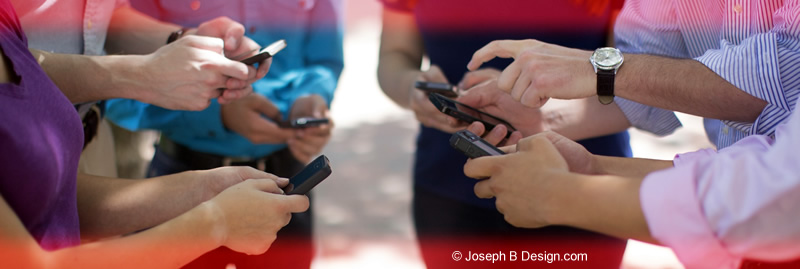
These devices all reside within our 100 yard radiuses, yet are delivering content that seemingly exists mostly outside of our 100 yard radiuses. The content seems to originate from outside our radiuses, and then take form as a new potential reality inside our radiuses. Many people believe in a lot of the content that comes out of these devices with glowing screens. Other people do not believe in the content and refer to it simply as fictional stories or illusions. Some people believe in some of the content while seeing other content as fictional.
The variations of ways that people interact with, think about, define, and believe or not in the content are vast and complex. As people are moving around in their 100 yard radiuses, they are also being influenced, manipulated, and distracted by the content coming from the devices with the glowing screens. At times it can be difficult to determine which is more real – the content coming from the glowing screens or the things your senses can verify within your 100 yard radius?
The 100 yard radius philosophy is about taking a deeper look at what you consider to be real and true, and suggests that there is more truth in what your senses can witness within your 100 yard radius than in what you'll find being delivered by the content providers. Each of us makes many choices in the course of a day, and our choices are influenced by both what we personally witness in our 100 yard radius, and by the content delivered via the glowing screens. By simply remembering that you can freely move between your 100 yard radius reality and the relatively fictional reality being presented to you by the content providers, you can easily gain more peace of mind if you become troubled by what you see and feel. The 100 yard radius philosophy is about embracing your ability to find greater peace of mind by making distinctions between these two realities, and then determining which one is more believable and real for you.
The variations of ways that people interact with, think about, define, and believe or not in the content are vast and complex. As people are moving around in their 100 yard radiuses, they are also being influenced, manipulated, and distracted by the content coming from the devices with the glowing screens. At times it can be difficult to determine which is more real – the content coming from the glowing screens or the things your senses can verify within your 100 yard radius?
The 100 yard radius philosophy is about taking a deeper look at what you consider to be real and true, and suggests that there is more truth in what your senses can witness within your 100 yard radius than in what you'll find being delivered by the content providers. Each of us makes many choices in the course of a day, and our choices are influenced by both what we personally witness in our 100 yard radius, and by the content delivered via the glowing screens. By simply remembering that you can freely move between your 100 yard radius reality and the relatively fictional reality being presented to you by the content providers, you can easily gain more peace of mind if you become troubled by what you see and feel. The 100 yard radius philosophy is about embracing your ability to find greater peace of mind by making distinctions between these two realities, and then determining which one is more believable and real for you.

There is an assumption that because we all have so much more access to various kinds of content, we are more informed, smarter, and more knowledgeable because of it. And in many ways this is true. But in many ways this is also false due to the quality of the content, which is a mix of fiction, fantasy, potential facts, and personal opinions. And because so many people now have the ability to share their own opinions via social media sites on the internet, it has become even harder to accurately determine truth from lies and fact from fiction. The 100 yard radius philosophy suggests that you will find more truth and factual information in what your senses can witness and verify, than can be found within all the prepared content being provided.
You can also gain more peace of mind by simply acknowledging that perhaps you don't really know what's going on outside of your 100 yard radius. Sure you may have some memories and factual information about where things are, where you've been, things you've done, where your friends live, how you get to work, etc. But how much can you absolutely know, in any given moment, about all that stuff which resides outside of your 100 yard radius? This philosophy suggests that beyond your memories and assumptions about that stuff, you probably don't know much specifically. And that's simply because you and everyone outside of your radius is constantly changing, moving and making new decisions.
The philosophical point is to notice how it feels to not really know that much about all that stuff. How does it feel to consider that you may not really know what lies beyond your radius? Does this notion bring you peace of mind or discomfort? Do you think this notion is true or false? Is it a weight off your shoulders to possibly not consider all that other stuff going on outside your radius? Is there a sense of ease for you when you drop the pretense of somehow thinking you do know what's going on out there? The 100 yard philosophy is about how you personally want to play around with these notions around what you know, what you think you know, what you want to know, and what you want to cease knowing about. The goal of this philosophy is to learn more about how you can create a more peaceful existence for yourself while you are witnessing whatever information you choose to take in, no matter the source.
Of course now that America has evolved to this time of information and opinion overload, there's no way of really going back to a place where there's less content available. The 100 yard radius philosophy suggests that it may feel better to tune out more of the prepared content stream and tune into more of what your senses are actually witnessing around you. When the pre-recorded, scripted, prepared, and manufactured information from the content being delivered begins to wear you down and make you feel sad, frustrated, angry or depressed, remember that you can always turn away from the glowing screens and simply take in that which solely resides in your 100 yard radius. You can even think of your radius as a place where you can become more grounded and feel more secure, since it is composed of only you and your immediate physical surroundings. Without the distraction of the glowing screens you can hear your own heart beat and feel the rhythm of your breath moving in and out, leading to more ease and a sense of just being yourself, quiet, alone, and at peace.
You can also gain more peace of mind by simply acknowledging that perhaps you don't really know what's going on outside of your 100 yard radius. Sure you may have some memories and factual information about where things are, where you've been, things you've done, where your friends live, how you get to work, etc. But how much can you absolutely know, in any given moment, about all that stuff which resides outside of your 100 yard radius? This philosophy suggests that beyond your memories and assumptions about that stuff, you probably don't know much specifically. And that's simply because you and everyone outside of your radius is constantly changing, moving and making new decisions.
The philosophical point is to notice how it feels to not really know that much about all that stuff. How does it feel to consider that you may not really know what lies beyond your radius? Does this notion bring you peace of mind or discomfort? Do you think this notion is true or false? Is it a weight off your shoulders to possibly not consider all that other stuff going on outside your radius? Is there a sense of ease for you when you drop the pretense of somehow thinking you do know what's going on out there? The 100 yard philosophy is about how you personally want to play around with these notions around what you know, what you think you know, what you want to know, and what you want to cease knowing about. The goal of this philosophy is to learn more about how you can create a more peaceful existence for yourself while you are witnessing whatever information you choose to take in, no matter the source.
Of course now that America has evolved to this time of information and opinion overload, there's no way of really going back to a place where there's less content available. The 100 yard radius philosophy suggests that it may feel better to tune out more of the prepared content stream and tune into more of what your senses are actually witnessing around you. When the pre-recorded, scripted, prepared, and manufactured information from the content being delivered begins to wear you down and make you feel sad, frustrated, angry or depressed, remember that you can always turn away from the glowing screens and simply take in that which solely resides in your 100 yard radius. You can even think of your radius as a place where you can become more grounded and feel more secure, since it is composed of only you and your immediate physical surroundings. Without the distraction of the glowing screens you can hear your own heart beat and feel the rhythm of your breath moving in and out, leading to more ease and a sense of just being yourself, quiet, alone, and at peace.
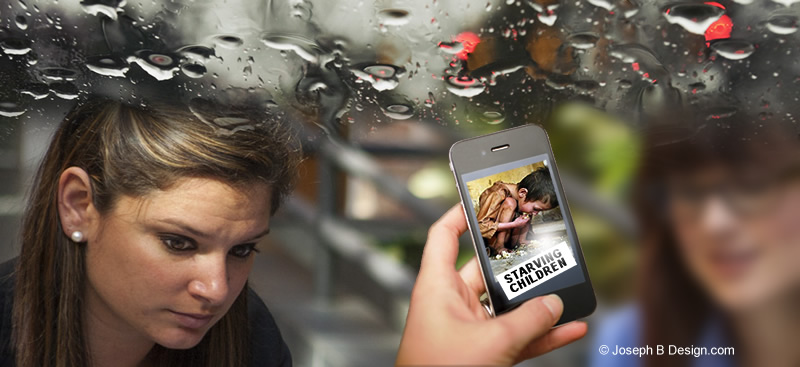
There is an argument to what I'm presenting here which suggests that if you don't tune into the content, you are ignoring important problems going on in parts of the world outside of your 100 yard radius, and are therefore ignorant of those problems and the other realities they represent. And of course there's some truth to that argument. And if you want to tune into other peoples scripted and pre-recorded stories about problems in other parts of the world, that's just fine. Whether you choose to believe in those stories or not is entirely up to you. Whether you choose to actually go to some of these other places and see what shows up in your 100 yard radius while you're there is also entirely up to you.
This philosophy only suggests that you look closely at what you determine to be true and real and believable, be it from your own 100 yard radius, from any content being streamed to you via glowing screens, from any other person, or from anywhere. The great thing about being us is that we can make all kinds of choices and we can always determine how we choose to see the life that is presented to us at any given moment. And we also get to change our mind about it anytime we want.
So, how does it feel to consider your life without any media or other content via glowing screens? What does it look like to just turn all the prepared content off? Does that sound exciting or is it scary? How hard would it be to really tune out of all that content? How long do you think you could do it before something or someone made you tune back in? How does that content influence your 100 yard radius? Does any of this 100 yard radius philosophy even matter to you?
As I ponder this little philosophy of mine today, I am mostly interested in these questions of what I consider to be real versus fiction because of how much I see people being influenced and manipulated by their content machines. I've watched things like stress, anger, fear, confusion, and overwhelm increase in both myself and others over the past three decades due in part to what is being presented via those glowing screens.
This philosophy only suggests that you look closely at what you determine to be true and real and believable, be it from your own 100 yard radius, from any content being streamed to you via glowing screens, from any other person, or from anywhere. The great thing about being us is that we can make all kinds of choices and we can always determine how we choose to see the life that is presented to us at any given moment. And we also get to change our mind about it anytime we want.
So, how does it feel to consider your life without any media or other content via glowing screens? What does it look like to just turn all the prepared content off? Does that sound exciting or is it scary? How hard would it be to really tune out of all that content? How long do you think you could do it before something or someone made you tune back in? How does that content influence your 100 yard radius? Does any of this 100 yard radius philosophy even matter to you?
As I ponder this little philosophy of mine today, I am mostly interested in these questions of what I consider to be real versus fiction because of how much I see people being influenced and manipulated by their content machines. I've watched things like stress, anger, fear, confusion, and overwhelm increase in both myself and others over the past three decades due in part to what is being presented via those glowing screens.
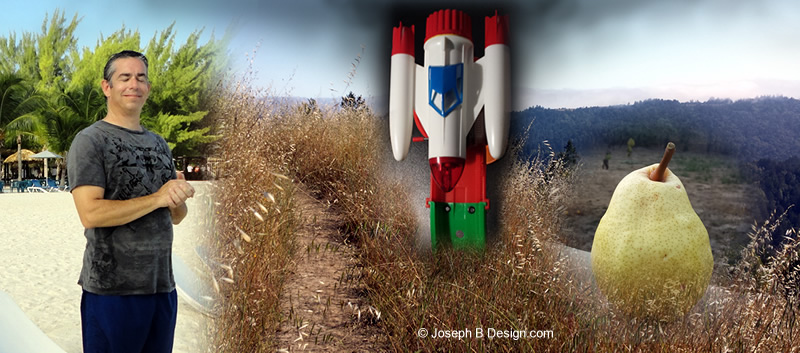
I have personally found relief in becoming more aware of my own 100 yard radius reality. I have an increased sense of knowing what is real simply because all my senses are interacting more with what's in front of me or behind me or to the side of me, while interacting less with whatever surreal content shows up via a glowing screen that invites me to pay attention to it. I like that I don't really know the truth of what the prepared content is showing me. I like that most of the time the content presents itself like a fictional fantastical movie or play, and that I'm the one who gets to decide if I think it's real or true or if I even want to consider it at all.
What's in your 100 yard radius?
CHAPTER TWO – What If Your 100 Yard Radius Is Challenging?
To be continued.
What's in your 100 yard radius?
CHAPTER TWO – What If Your 100 Yard Radius Is Challenging?
To be continued.
